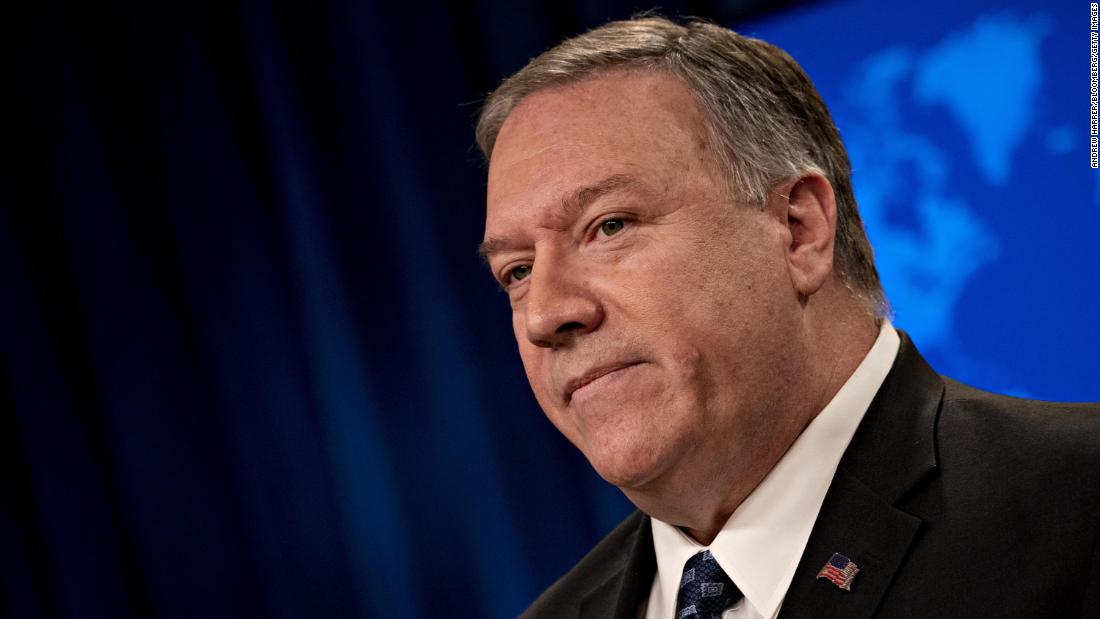
On the Sunday after the strike, the secretary of state appeared on all five of the major Sunday talk shows to make the administration's case.
(Sidebar: Appearing on all of the Sunday shows does have a name. Because, Washington. It's called a "full Ginsburg." Why? Because William Ginsburg, Monica Lewinsky's attorney, first accomplished the five-Sunday-shows thing in 1998.)
How did Pompeo become the face of the biggest foreign policy move of President Donald Trump's time in the White House? The same way he has turned himself into the one indispensable figure in the President's circle of advisers: with unflinching and unquestioned loyalty to Trump.
Pompeo's ascent to Trump's right-hand man would have been very hard to imagine just a few years ago.
After all, as a member of Congress from Kansas, Pompeo wasn't terribly high-profile -- even among House Republicans. His one moment in the sun -- prior to Trump's election -- came in 2015 when he served on the House Select Committee on Benghazi and took part in the 11-hour questioning of former Secretary of State (and eventual 2016 Democratic presidential candidate) Hillary Clinton.
And Pompeo wasn't an early supporter of Trump's, um, unorthodox presidential candidacy. Quite the opposite, actually!
Pompeo was intimately involved in convincing Florida's Sen. Marco Rubio to seriously contest the Kansas caucus in 2016 -- as part of a broader attempt to keep Trump from the Republican nomination.
In making the case for Rubio to Kansas Republicans, Pompeo said that Trump would be "an authoritarian President who ignored our Constitution." Citing Trump's claim that the military would commit a war crime if he told them to, Pompeo said this: "Marco Rubio will never demean our soldiers by saying that he will order them to do things that are inconsistent with our Constitution."
Even after Rubio had dropped out of the race and it became clear that Trump was going to be the Republican nominee, Pompeo still wasn't sold.
In May 2016 he told a local Kansas paper that Trump was "not a conservative believer." On CNN that same month, Pompeo said Trump's policies "don't comport with my vision for how I represent Kansas."
But later that month, Pompeo endorsed Trump for president. And he has never looked back. Nor, it's worth noting, has he ever explained what made him change his mind about Trump. Hmmmm.
Fast-forward to November 2016. Trump wins. Trump himself -- and the rest of the world -- is stunned. And he has very, very few advisers to lean on for solid information about how Washington (and the world) works.
Enter Pompeo. He was on the House Intelligence Committee. He had gone to West Point, graduating #1 in his class, and then on to Harvard Law School. (Sidebar: Trump looooooves a resume packed with academic achievement.) And perhaps most importantly, Pompeo was close with Trump Vice President Mike Pence, who recommended him to Trump for a possible job in the administration.
Just two days after Trump met Pompeo for the first time, according to The New Yorker -- a job interview at Trump Tower, of course -- he announced that the Kansas Republican would run the Central Intelligence Agency for him.
Less than 18 months later, Pompeo was secretary of state -- promoted to the gig in March 2018 following Trump's dumping of Rex Tillerson from the job via Twitter. (Sidebar: Firing people by tweet is very, very Trumpian.)
"Tremendous energy, tremendous intellect, we're always on the same wavelength," Trump said of Pompeo in announcing his secretary of state pick. "The relationship has been very good, and that's what I need as secretary of state."
Other people less favorably disposed to Pompeo have put the closeness between the secretary of state and the President in, uh, different terms. "He's like a heat-seeking missile for Trump's ass," a former American ambassador told The New Yorker's Susan Glasser of Pompeo.
Which is an image!
No matter how you describe it, it's very, very clear that Pompeo's status within Trump's Cabinet is dependent in large part on his willingness to acquiesce to the President's view on, well, everything.
How far does Pompeo's loyalty to Trump extend? In January, Pompeo decided against running for an open Senate seat in his home state -- a race he would have entered as a massive favorite in both the Republican primary and the general election.
"I've said that I'm going to stay serving as secretary of state so long as President Trump shall have me," Pompeo said explaining his decision.
The Point: Walking away from a sure-thing Senate seat ain't easy. But that he did it shows just how closely Pompeo has latched his political future to President Trump.
"how" - Google News
January 09, 2020 at 07:57AM
https://ift.tt/2N5h1Ij
How Mike Pompeo became the most powerful official in Trump's Cabinet - CNN
"how" - Google News
https://ift.tt/2MfXd3I
Bagikan Berita Ini














0 Response to "How Mike Pompeo became the most powerful official in Trump's Cabinet - CNN"
Post a Comment